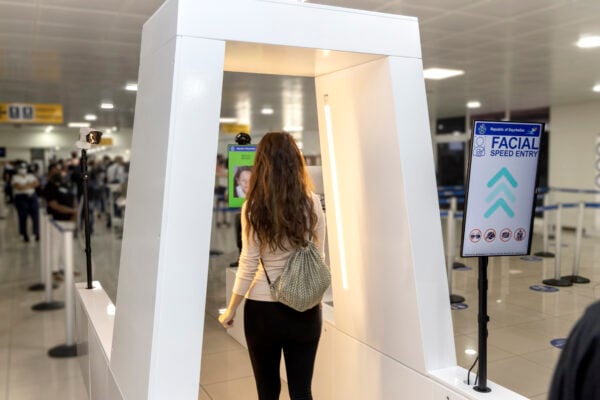In today’s interconnected world, ensuring robust security measures while facilitating smooth travel remains a priority for governments globally. Decision-makers face an ever-evolving quest for effective border security technologies to tackle modern threats.
Historically, governments relied on travel policies, such as Visa policies, to ensure safety at the border. With a visa system in place, travelers from visa non-exempt countries have to apply for permission to enter the country prior to travel. In many cases, the visa process can be resource-intensive and often takes weeks, is expensive and requires an in-person appointment at an embassy or consulate which may be located in a neighboring city or country.
What this means however, is that everyone from a visa-exempt country is effectively deemed low risk and is not pre-screened by national authorities. In today’s sophisticated threat landscape, such blindspots can have serious repercussions.
Systems that allow the pre-screening and risk-assessment of visa-exempt travelers, such as Electronic Travel Authorizations, have seen a rise in prominence over recent years. Governments have recognised the importance of knowing their visitors before they present themselves at the border – with or without a visa.
One such indispensable tool is the API-PNR system (Advance Passenger Information/Passenger Name Record). API-PNR serves as the linchpin in pre-travel screening, empowering authorities to enhance border security while facilitating visa-exempt regimes. By collecting and analyzing information directly from the carriers, Governments have advance notice of anyone (Visa non-exempt and visa-exempt) planning to travel to, transit through or leave the country.
Having advance information about travelers is a huge advantage for Border Agents, who can better plan their resources on the ground, identify potential high-risk individuals and even deny boarding at port of origin.
In a global context, API-PNR has already exhibited its efficacy. Take, for instance, the case of the European Union’s utilization of API-PNR in bolstering security measures. By collecting and analyzing travel data of passengers flying into or out of the EU, authorities can flag suspicious patterns or individuals, thereby fortifying border security without impeding the flow of legitimate travelers.
What is an API-PNR system?
A system that collects biographical information directly from the airlines and general aviation. API and PNR data are collected at different time periods prior to flight departure. API captures the traveler’s personal information as well as flight information and PNR captures travel itinerary, contact information, lodging information, and more. When combined, these datasets provide invaluable insights into passenger movements and backgrounds, empowering authorities to preemptively assess potential risks and ensure the safety of national borders.
By obtaining information in advance of arrival, Border Agents can cross-check passenger information against international and national watchlists to identify “known” high-risk individuals. Travizory’s API-PNR system harnesses Artificial Intelligence (AI) and Machine Learning to exponentially expand the profiling capabilities of the system. This allows authorities to identify travelers that fall under “known-unknown” and “unknown-unknowns” persons of interest that can present a threat to the nation. AI and ML permit the system to learn to anticipate threats.
Moreover, API-PNR’s role extends beyond mere security measures. It streamlines immigration processes, minimizing delays and enhancing the overall travel experience for passengers. Imagine a seamless journey where travelers move swiftly through checkpoints, confident in the knowledge that stringent security measures are in place.
Designed originally for the commercial aviation sector, API-PNR can be extended to other modes of transport. Travizory’s multi-modal API-PNR system works across land, air and sea commercial transport for both international and domestic travel.
Why is API-PNR a necessity for Governments?
The necessity for such a system is amplified in today’s complex threat landscape. With evolving security challenges, including terrorism, illegal immigration, human trafficking, and other transnational crimes, decision-makers face an unprecedented need for robust screening mechanisms. API-PNR provides the preemptive edge necessary to counter these threats effectively.
Recognising the impact API-PNR systems can have in addressing global security challenges, the United Nations called on member states to require airlines to provide API-PNR data. The International Civil Aviation Organisation (ICAO) has also published standards for the collection and processing of API and PNR data.
By embracing this technology, nations can create a fortified shield against potential risks while fostering smoother, more efficient travel experiences for their citizens and visitors. The potential collaborative sharing of passenger data between countries (via bilateral agreements) wouldenable a comprehensive security net that transcends borders, bolstering security efforts collectively.
However, the implementation of API-PNR necessitates a delicate balance between security and privacy concerns. It is imperative to construct a framework that ensures the judicious use of passenger data, adhering to stringent privacy laws and regulations. At Travizory, we uphold the highest data standards – our entire Platform uses Privacy By Design principles, we are GDPR compliant and successfully completed the SOC 2 Type I Audit.
Our cutting-edge solutions are tailored to assist governments and authorities in deploying and managing API-PNR systems seamlessly. By harnessing the power of advanced technology, we strive to enable secure, efficient travel experiences while upholding the highest standards of data privacy and security.
Should API-PNR replace my Visa system?
An API-PNR system complements the Visa system offering a stronger layer of defense at the border – but the best systems are not implemented in isolation. Evidence from around the world suggests that the most effective border security systems are those which are fully integrated, draw on multiple data sources and use innovative technologies to anticipate and predict threats.
Research from the International Air Transport Association also confirms that speed and convenience are top priorities for passengers. Reflecting these findings, there has been an exponential growth in biometrics and widespread introduction of eVisa systems – end-to-end digital Visa platform that offers a simpler and more efficient experience for the applicant. However, research found that the majority of fielded “eVisa” systems are basically online application forms, which do not offer the full security benefits of an end-to-end eVisa management system.
Balancing security and facilitation, Travizory’s end-to-end Visitor Management Platform features individual modules including Electronic Travel Authorization, eVisa system and API-PNR proven to offer a 20x increase in security when deployed together.
A well designed API-PNR system allows Governments to maintain, and in many cases extend, their visa-exempt regime in order to attract higher numbers of visitors and remain competitive as a destination. Receiving advance data about all travelers, means that only those deemed high-risk need to be stopped at the border or denied boarding at the port of origin. When combined with facial biometrics and AI, an API-PNR system becomes a powerful addition to the Border Agent’s arsenal.
In essence, API-PNR serves as a cornerstone in advancing border security, enabling the realization of visa-exempt regimes without compromising safety. When used in conjunction with other border security systems including an eVisa system, it promises a paradigm shift towards actionable intelligence, seamless travel and paperless border crossings.
BLOGS
Latest articles


